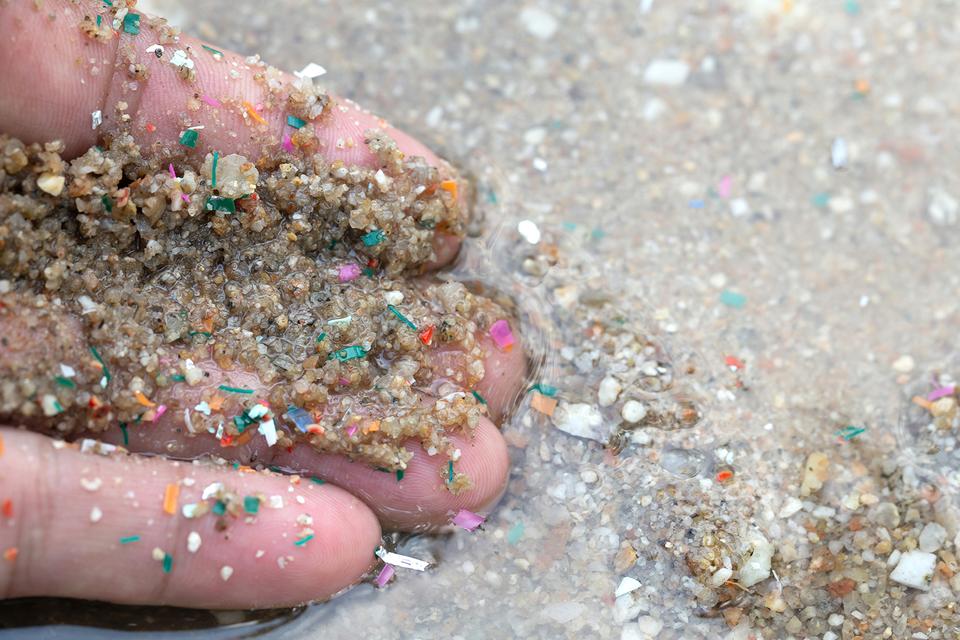CQU Research help local councils identify and raise awareness of microplastics

Description
CQUniversity Coastal Marine Ecosystems Research Centre (CMERC) Research Fellow Dr Angela Capper is using ‘Plastic Free July’ to highlight the projects that CQU is undertaking to reduce the impact of microplastics on the environment. As part of the project, 18 'drain buddies' have been installed across the Rockhampton Regional Council and Livingstone Shire Council areas in Queensland, Australia to capture microplastics associated with road-based plastic pollution.
Dr Capper said the project was about better understanding plastic-based sources of waste, so that methods could be developed at a state, national or global level to avoid, or reduce plastics entering stormwater systems.
Partners
Queensland Government, Rockhampton Regional Council, Livingstone Shire Council, Pipe Management Australia, Queensland Water Regional Alliances Program.
Impact
The aim of the research is to help everyone who manages road or stormwater and supply-associated products, by giving them further insight into what might be entering their stormwater systems. The drain buddies for this research were specially adapted to capture plastic material associated with road-based activities, such as road painting, artificial turf installation and tyre-crumb based coverings at playgrounds.
Researcher
Dr Angela Capper
With more and more microplastics emerging in our oceans, CQUniversity researchers are working with local government to introduce ‘Drain Buddies’ to ascertain what exactly is being washed down our drains and hopefully make their communities more aware.
CQUniversity Coastal Marine Ecosystems Research Centre (CMERC) Research Fellow Dr Angela Capper is using ‘Plastic Free July’ to highlight the projects that CQU is undertaking to reduce the impact of microplastics on the environment.
“CMERC received $50,000 in funding through the Queensland Government’s Community Sustainability Action grants – Litter and Marine Debris Clean Up and Prevention - to look at road-based microplastic pollution,” Dr Capper said.
“As part of the project, 18 'drain buddies' have been installed across the Rockhampton Regional Council and Livingstone Shire Council areas to capture microplastics associated with road-based plastic pollution.”
Dr Capper said the project was about better understanding plastic-based sources of waste, so that methods could be developed at a state, national or global level to avoid, or reduce plastics entering stormwater systems.
“Ultimately, this research should help everyone who manages road or stormwater and supply-associated products, by giving them further insight into what might be entering their stormwater systems,” she said.
A 'drain buddy' is a stormwater pit insert provided by Pipe Management Australia, which captures litter and debris at the drain before it enters the stormwater network.
Dr Capper said the drain buddies for this research had been specially adapted to capture plastic material associated with road-based activities, such as road painting, artificial turf installation and tyre-crumb based coverings at playgrounds.
She said that between October 2021 and December 2022, more than 11kg of litter and 273.89kg of organic material had been collected in the drain buddies.
There are 15 drain buddies in Rockhampton and three in Yeppoon.
“We now have to process that 273.89kg of organic material and extract microplastics from it to see how much artificial grass, soft-fall cover, road paint and tyre dust are in the samples,” she said.
“There are also two emptying rounds for all 18 drain buddies to add to these totals before the end of the project later this year.
“So, what this will highlight is that the plastic we often don't think about associated with road-based activities is also going down our drains. Most of the larger litter we collect in drain buddies, which are plastic-based, include cigarette butts (microfibres in the butts), plastic food and cigarette wrappings, plastic-coated take-away cups, lids, plastic bottles, plus other smaller items such as confetti and glitter.”
She said another CMERC project related to assessing the presence of emerging contaminants of concern (ECCs) associated with wastewater treatment plant discharges was also being carried out.
Funded through the Queensland Water Regional Alliances Program for $76,678, the project involves working with three regional councils in Northern and Central Queensland to look at pharmaceuticals, personal care products and microplastics coming through wastewater treatment plants (WWTP).
“With regards to microplastics, the WWTP's are doing a great job at keeping microplastics from our urban wastewater out of our waterways, however we are still seeing some microplastics (< 1 mm), particularly microfibres in some of our samples, but this is at much lower levels than expected.
“A single six kilogram wash can release as much as 700,000 microfibres. As most of the microplastics we see going into our urban wastewater seems to be clothing fibres, the alternatives are to look for clothes made of natural fibres such as cotton, linen and bamboo.
“Also newer washing machines have filters which can be emptied regularly into your general waste or there are devices such as 'laundry balls' which capture microplastics during the wash which you can also empty.
“We all need to re-think our use of plastic and look for alternatives which may be bio-degradable or at least recyclable and we certainly need to take more care when throwing these items away...for everyone who lives close to our beautiful coast, what goes down the drains goes straight to the ocean.”
CQU PhD student, Jack Greenshields is also looking at microplastics once they get into our ecosystems, in mangroves and seagrass beds.
“I'm looking into whether mangroves and seagrass meadows are at risk of trapping microplastics in their leaves and root systems,” Jack said.
“I'm also looking into what negative health effects the microplastics and the chemical additives contained within them may have on these ecosystems if they do become trapped.”
Connect with CQUniversity
At CQUniversity we know the value of our connections locally and around the world. Our partnerships help us create opportunities, deliver solutions and change lives. From time to time, we share our Connections Count update where we share our highlights, including research impact stories like the ones above. Sign up to become one of our valued connections.
